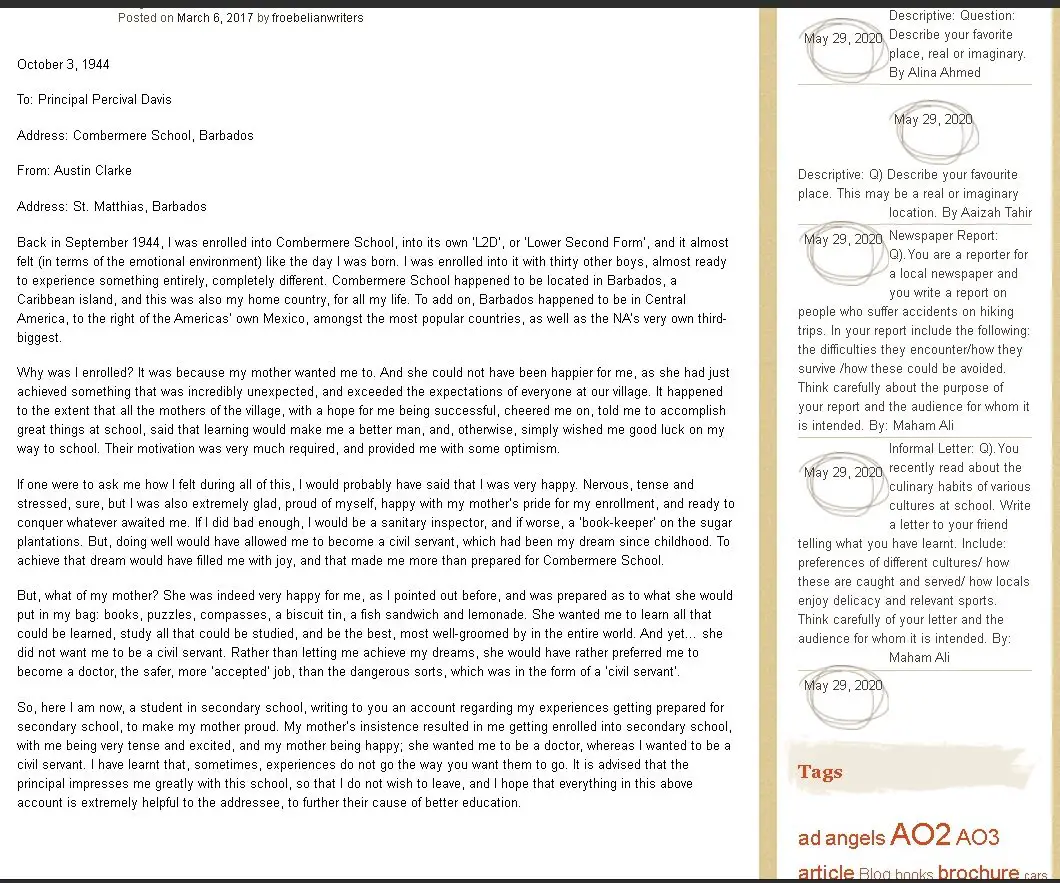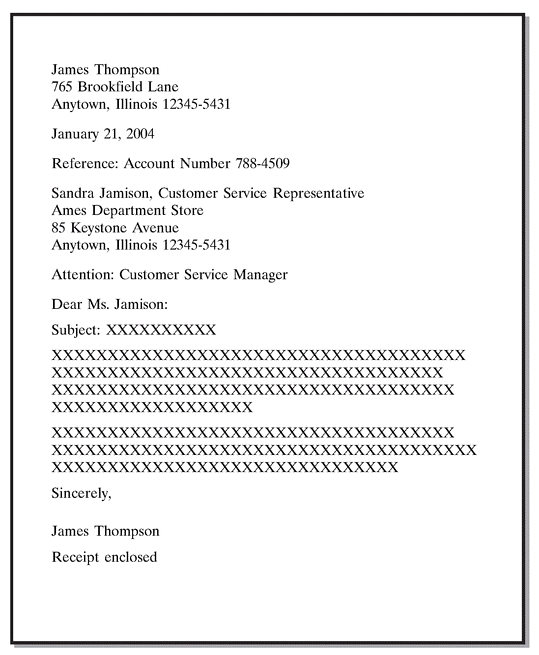What is Account Writing?
The writing of the account refers to an account that can or cannot be included as a subject.
Account write is done to provide the reader with the order of events.
In the first line of a published account are the answers to ‘Where?’ ‘What is this? ‘When? Where? ‘And there is followed an explanation.
Check Out also: ARGUMENTATIVE WRITING
Format
CheckOut also: O Level English (1123)
Some Important Points to look
- There may be no subject line on an account or may not. It would be the same to start with a date written on the top.
- Accounts have to direct the reader as to exactly what happened and how. Contrary to other reports, ‘What,’ ‘Where’ and ‘When’ must be answered in the first paragraph, followed by the incident clarification.
- The Tone of an account depends on to whom the account is written. If the question clearly states that the account should be written to a headmaster or an inspector/ Police officer, then it is pretty obvious that the tone should be formal, polite, and respectful.
- An account may have personal sensations. The candidate may, therefore, choose the emotive language and sensational words and phrases as far as those assists in providing relevant information to the recipient.
- The candidate is free to give his opinion about the event. He may provide suggestions to certain matters even if he/she isn’t asked to.
- The sentences can be varied in style and structure conforming to the details and information is provided.

Understanding Account Writing: Definition, Purpose, and Examples
Account writing is an essential skill that serves various purposes across multiple contexts, from personal diaries to professional reports. In this post, we will delve into the definition, the use cases, including real-world examples, and the format and structure typically associated with this form of writing.
Account writing is an essential skill that serves various purposes across multiple contexts, from personal diaries to professional reports. In this post, we will delve into the definition, the use cases, including real-world examples, and the format and structure typically associated with this form of writing.
Account writing is a meticulous method of recording events, experiences, or transactions, focusing on delivering information that is factual, detailed, and organized chronologically. It is not just about noting down what happened but providing a reliable description that captures the essence and facts of the event or transaction.
Purpose:
Serves as a comprehensive record that stands as a testament to accuracy and unbiased reporting.
Purpose and Use Cases
Account writing is particularly beneficial for O Level and A Level students and anyone seeking structured information that can be used for study, work, or personal reflection. The key goal is to guide readers through a clear account of events, encouraging meticulous documentation and record-keeping practices.
Uses of Account Writing
- Personal Diary Entry:
Used for capturing daily experiences, thoughts, and accomplishments, allowing individuals to reflect on their personal growth.
- Financial Record:
Essential for tracking business or personal income and expenditures, ensuring financial accountability and planning.
- Historical Documentation:
An account of events in history, recorded in a factual manner, helps preserve the past for future generations.
- Professional Report:
Critical for detailing the sequence of events in workplace incidents, providing an objective analysis and facilitating organizational learning.
Format and Real-World Examples
Account writing, while flexible in its application, adheres to certain structural elements to ensure the information is communicated effectively. Below is an outline with associated real-world applications:
Personal Diary Entry:
Date: (specific date of entry)
Time: (time of the recorded event)
Subject: (core focus of the diary entry)
Body: (description of the events, emotional reflections, etc.)
Closing thoughts: (overall reflection or resolution for the day)
Example:
Date: March 16, 2023
Time: Evening
Subject: Reflection on Public Speaking Event
Body: Today was incredible; presented my first public speech…
Financial Record:
Date: (date of transaction)
Transaction Details: (brief description of the transaction)
Amount: (specify the amount in appropriate currency)
Category: (income or expense category)
Balance: (current balance after transaction)
Example:
Date: March 16, 2023
Transaction Details: Freelance payment received for graphic design project
Amount: $500
Category: Income
Balance: $2,500
Historical Documentation:
Date & Time Period: (date and period being documented)
Event Name: (key historical event)
Participant(s): (main figures or entities involved)
Description: (factual recount of what transpired, sources cited)
Impact/Outcome: (consequences or aftermath of the event)
Example:
Date & Time Period: May 8, 1945 – VE Day (Victory in Europe Day)
Event Name: End of WWII in Europe
Participant(s): Allied Powers, Axis Powers
Description: Germany surrendered unconditionally to the Allies…
Professional Report:
Date of Incident: (date when the incident occurred)
Type of Incident: (nature of the incident – technical, safety, etc.)
Affected Parties: (individuals or departments involved)
Chronological Account: (step-by-step account of the incident)
Analysis: (objective evaluation of the incident)
Recommendations: (proposed actions to prevent future occurrences)
Example:
Date of Incident: March 16, 2023
Type of Incident: Data Breach
Affected Parties: IT Department, Customers
Chronological Account: At 10 AM, an unauthorized access…
Research Log:
Date of Entry: (date of research activity)
Objective: (specific goal or question of the research session)
Research Method: (description of the method used – interview, literature review, etc.)
Key Findings: (summary of the important information gathered)
Next Steps: (planned actions based on the findings)
Example:
Date of Entry: March 16, 2023
Objective: Understanding the impact of social media on teen mental health
Research Method: Survey with 100 high school students
Key Findings: Approximately 65% reported feeling increased anxiety related to social media use
Next Steps: Conduct follow-up interviews to gain deeper insights into the specific causes of anxiety
Meeting Minutes:
Date: (date of the meeting)
Attendees: (list of individuals present)
Objectives: (main goals of the meeting)
Discussion Summary: (key points discussed during the meeting)
Decisions Made: (conclusions or actions agreed upon)
Action Items: (specific tasks assigned to attendees, with deadlines)
Example:
Date: March 16, 2023
Attendees: John Smith, Jane Doe, Alex Johnson
Objectives: To finalize the Q2 marketing strategy
Discussion Summary: Discussed prospective channels for the campaign, emphasis on digital marketing
Decisions Made: Approved a budget increase for social media advertising
Action Items: Jane to optimize the ad design by March 23, Alex to prepare the content calendar by March 25
Conclusion
Mastering the art of account writing is advantageous for students, professionals, and any individual interested in preserving accurate records of their transactions, experiences, or responsibilities.
Not only does it enhance one’s ability to communicate effectively, but it also instills a sense of discipline in one’s approach to documentation.
Account writing remains a timeless and versatile tool in embodying the integrity of our collective narratives, personal journeys, and professional endeavors.
Remember to integrate the keyword “Account Writing” throughout your content to optimize for SEO and ensure that the topic is clearly articulated for readers and search engines alike.
Should you require templates or further detailed samples for account writing scenarios, there are many resources available both online and in academic publications that provide comprehensive guides and examples.


